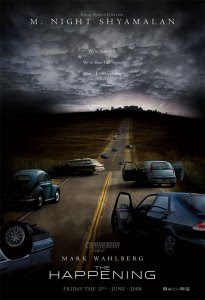 I recently saw M. Night Shyamalan’s new movie, The Happening. I could give my two cent review on this film, but everybody nowadays is a critic. All you have to do is go to Rottentomatoes.com to see what the major critics feel about the film. Most don’t like it. And as big of a fan as I am of Shyamalan’s, I have to agree with them.
I recently saw M. Night Shyamalan’s new movie, The Happening. I could give my two cent review on this film, but everybody nowadays is a critic. All you have to do is go to Rottentomatoes.com to see what the major critics feel about the film. Most don’t like it. And as big of a fan as I am of Shyamalan’s, I have to agree with them.
But before I go on, let me share something. It is far easier to criticize than it is to create. Everybody can start a blog and then start ranting off every single opinion they have. That’s fine—rant and rave all you want. It’s one thing to create an opinion over something that somebody made. A movie, an album, a novel. But to create something out of nothing—not that’s hard work. And most people don’t know just how hard it is.
When dealing with stories, whether it’s in book form or movie form, it usually starts with a premise. A great idea that worthy of building a whole story around. I know something about this—I get ideas all the time, and recently had two great premises which I wrote novels off of. What I learned in both cases is that a great premise is not enough. You need to create tension and stakes and characters and a complete story to build that premise on.
I think this is where The Happening falls apart. We could debate if the premise itself is good enough to make a movie out of. Let’s assume it is. The rest of the film just doesn’t work—things like the story, dialogue, tension, the climax. I have a feeling that Shyamalan got the premise and dove right into the movie without spending enough time on the story itself.
I recently handed a book in which is built around a very compelling premise. But I didn’t do a good enough job in the area of stakes and tension. I’m going back through the story to ratchet up the stakes and the drama and to work on sharpening the storytelling and the characters. It’s a hard job—sometimes I hate this process, because it makes me feel so inept at times. But that’s the process of creating something out of nothing. You put it out there to get critiqued. At this point, I’m in the rewriting stage, and the input I’m getting from my editor is dead on. I trust her. I need to trust her because sometimes I don’t even trust myself.
But usually out of soul-searching and struggling comes an improved story.
I have a feeling that someone as big and brilliant as M. Night Shyamalan doesn’t have those around him to tell him no. I live in a “no” world. Heck—even my 19-month old daughter loves telling me no. I have not had enough success to allow me the luxury of being surrounded by “yes” people. And I’m fortunate for that. Because I’m having to work harder to craft a story.
But hopefully that story will pay off and be rewarding for the reader. As brilliant as Shyamalan is (and I love all of his other movies including Lady in the Water), he needs input and guidance. He needs someone he trusts to pull him aside and say “this is corny” or “this just isn’t happening.” Okay, sorry, bad pun. But it’s true.
Sometimes it’s good to see something that’s not so brilliant to help get your courage back on the upswing. Not everybody can create a masterpiece, and even those who do probably aren’t sure whether it’s a masterpiece or a mess. Sometimes when you see something that is really, truly messy, you can understand why a story works and why another doesn’t.